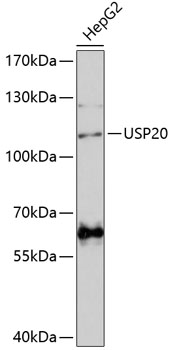Cell Biology Antibodies 5
Anti-USP20 Antibody (CAB14643)
- SKU:
- CAB14643
- Product Type:
- Antibody
- Reactivity:
- Human
- Host Species:
- Rabbit
- Isotype:
- IgG
- Antibody Type:
- Polyclonal Antibody
- Research Area:
- Cell Biology
Description
| Antibody Name: | Anti-USP20 Antibody |
| Antibody SKU: | CAB14643 |
| Antibody Size: | 20uL, 50uL, 100uL |
| Application: | WB |
| Reactivity: | Human |
| Host Species: | Rabbit |
| Immunogen: | Recombinant fusion protein containing a sequence corresponding to amino acids 1-150 of human USP20 (NP_006667.3). |
| Application: | WB |
| Recommended Dilution: | WB 1:500 - 1:2000 |
| Reactivity: | Human |
| Positive Samples: | HepG2 |
| Immunogen: | Recombinant fusion protein containing a sequence corresponding to amino acids 1-150 of human USP20 (NP_006667.3). |
| Purification Method: | Affinity purification |
| Storage Buffer: | Store at -20'C. Avoid freeze / thaw cycles. Buffer: PBS with 0.02% sodium azide, 50% glycerol, pH7.3. |
| Isotype: | IgG |
| Sequence: | MGDS RDLC PHLD SIGE VTKE DLLL KSKG TCQS CGVT GPNL WACL QVAC PYVG CGES FADH STIH AQAK KHNL TVNL TTFR LWCY ACEK EVFL EQRL AAPL LGSS SKFS EQDS PPPS HPLK AVPI AVAD EGES ESED DDLK PRGL TGMK NL |
| Gene ID: | 10868 |
| Uniprot: | Q9Y2K6 |
| Cellular Location: | Cytoplasm, centrosome, cytoskeleton, microtubule organizing center, perinuclear region |
| Calculated MW: | 102kDa |
| Observed MW: | 110kDa |
| Synonyms: | USP20, LSFR3A, VDU2, hVDU2 |
| Background: | This gene encodes a ubiquitin specific processing protease that was first identified as a substrate of the VHL (von Hippel-Lindau disease) protein E3 ubiquitin ligase complex. In addition to being ubiquitinated by the VHL-E3 ligase complex, this enzyme deubiquitinates hypoxia-inducible factor (HIF)-1 alpha and thereby causes increased expression of HIF-1alpha targeted genes which play a role in angiogenesis, glucose metabolism, cell proliferation and metastasis. The enzyme encoded by this gene also regulates G-protein coupled receptor signaling by mediating the deubiquitination of beta-2 adrenergic receptor (ADRB2). This enzyme is a ubiquitously expressed thiolester hydrolase. Alternative splicing results in multiple transcript variants encoding the same protein. |
| UniProt Protein Function: | USP20: Deubiquitinating enzyme involved in beta-2 adrenergic receptor (ADRB2) recycling. Acts as a regulator of G-protein coupled receptor (GPCR) signaling by mediating the deubiquitination beta-2 adrenergic receptor (ADRB2). Plays a central role in ADRB2 recycling and resensitization after prolonged agonist stimulation by constitutively binding ADRB2, mediating deubiquitination of ADRB2 and inhibiting lysosomal trafficking of ADRB2. Upon dissociation, it is probably transferred to the translocated beta-arrestins, possibly leading to beta-arrestins deubiquitination and disengagement from ADRB2. This suggests the existence of a dynamic exchange between the ADRB2 and beta-arrestins. Deubiquitinates DIO2, thereby regulating thyroid hormone regulation. Deubiquitinates HIF1A, leading to stabilize HIF1A and enhance HIF1A-mediated activity. Mediates deubiquitination of both 'Lys-48'- and 'Lys-63'-linked polyubiquitin chains. Belongs to the peptidase C19 family. USP20/USP33 subfamily. |
| UniProt Protein Details: | Protein type:Ubiquitin-specific protease; EC 3.4.19.12; Ubiquitin conjugating system; Protease Chromosomal Location of Human Ortholog: 9q34.11 Cellular Component: centrosome Molecular Function:cysteine-type endopeptidase activity; G-protein-coupled receptor binding; protein binding Biological Process: protein deubiquitination; regulation of G-protein coupled receptor protein signaling pathway |
| NCBI Summary: | This gene encodes a ubiquitin specific processing protease that was first identified as a substrate of the VHL (von Hippel-Lindau disease) protein E3 ubiquitin ligase complex. In addition to being ubiquitinated by the VHL-E3 ligase complex, this enzyme deubiquitinates hypoxia-inducible factor (HIF)-1 alpha and thereby causes increased expression of HIF-1alpha targeted genes which play a role in angiogenesis, glucose metabolism, cell proliferation and metastasis. The enzyme encoded by this gene also regulates G-protein coupled receptor signaling by mediating the deubiquitination of beta-2 adrenergic receptor (ADRB2). This enzyme is a ubiquitously expressed thiolester hydrolase. Alternative splicing results in multiple transcript variants encoding the same protein. [provided by RefSeq, Jan 2013] |
| UniProt Code: | Q9Y2K6 |
| NCBI GenInfo Identifier: | 116242837 |
| NCBI Gene ID: | 10868 |
| NCBI Accession: | Q9Y2K6.2 |
| UniProt Secondary Accession: | Q9Y2K6,Q541F1, Q8IXQ1, Q96LG5, Q9UQN8, Q9UQP0, |
| UniProt Related Accession: | Q9Y2K6 |
| Molecular Weight: | 102,003 Da |
| NCBI Full Name: | Ubiquitin carboxyl-terminal hydrolase 20 |
| NCBI Synonym Full Names: | ubiquitin specific peptidase 20 |
| NCBI Official Symbol: | USP20 |
| NCBI Official Synonym Symbols: | VDU2; hVDU2; LSFR3A |
| NCBI Protein Information: | ubiquitin carboxyl-terminal hydrolase 20 |
| UniProt Protein Name: | Ubiquitin carboxyl-terminal hydrolase 20 |
| UniProt Synonym Protein Names: | Deubiquitinating enzyme 20; Ubiquitin thioesterase 20; Ubiquitin-specific-processing protease 20; VHL-interacting deubiquitinating enzyme 2; hVDU2 |
| UniProt Gene Name: | USP20 |
| UniProt Entry Name: | UBP20_HUMAN |
View AllClose







